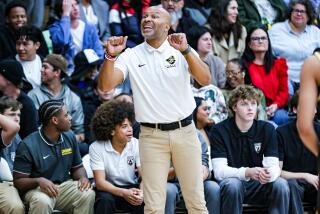When Expectation Is Reality
- Share via
Before the lunch bell rings each school day, I watch my students. Their eyes dance with excitement. Their bodies lean toward the door like sprinters awaiting the starter’s gun. Their feet anxiously tap the floor. Then, at the sound of my voice, they are released from a fate worse than death -- history class.
The girls run to various parts of the school, but the boys are off to the basketball courts.
I was once one of these boys.
As a youth, I loved basketball. I was faithful to my first love. However, my parents had another goal for me -- education. My earliest recollections include knowing that I would be a college graduate.
From my parents’ perspective, education was the key to success.
As an African American, I owed that much to my ancestors who had fought and died for such opportunities. But as a young black man growing up in Long Beach, I was caught between the Lakers’ championships and President Reagan’s “trickle down” theory of economics.
I was good at basketball, though not as talented as Kevin Garnett or Kobe Bryant.
But daily, as I watch minority students on the basketball court who aspire to become the next LeBron James or Allen Iverson, I am caught in a quagmire. As a teacher, do I encourage or extinguish their hoop dreams?
Perception is said to be reality. However, in the case of black students in general and black male athletes in particular, expectation is reality. While black athletes are in school to create opportunities for themselves via academics and athletics, the fact is, high school and collegiate athletic programs benefit economically from these young men.
The title of an article in The Times on Dec. 23, 2002, “The Wrong Message for Black Male Athletes,” is a curious one. The message seems to be that black male athletes are benefiting from their athletic abilities, not their academic opportunities. In other words, athletics are the only way out of their socioeconomically disadvantaged reality.
But what is the right message?
Is the right message for the athlete to forgo sports and pursue educational opportunities? Or is it to try to excel in a school where some teachers’ expectations regarding an athlete’s academic potential are low?
Malcolm Wooldridge, the student athlete in the story, confesses that “Man, the teachers bent over backward to keep you on the field.” That suggests that teachers expect black male athletes to fail in the classroom and that they need help to remain eligible.
However, we live in the United States, where the American dream is the freedom to make money. If he has been encouraged to pursue the dream with a ball rather than a book, can he be held solely responsible? Should he feel guilty? If high school athletes leave their peer groups to pursue multimillion-dollar NBA contracts, where is the harm? Aren’t they simply bypassing college to do what we are all trying to do, make more money? Isn’t that the American dream?
The recent NCAA investigation of graduation rates is important, however, because Division I schools have exploited this talent for economic reasons.
Black male athletes are treated as commodities rather than as students. Therefore, I offer this solution: To become true student-athletes, these athletes should consider historically black colleges and universities, such as three in Atlanta: Morehouse College, Clark Atlanta University and Morris Brown College.
As an alumnus of Morehouse College, an all-male, predominantly black college, I was expected to pursue rigorous academic goals. Morehouse demands that its students strive for excellence in academic and extracurricular endeavors. Morehouse is interested in preparing its students for life. It is not in the business of capitalizing on the talents of student athletes, then admonishing them for not succeeding in the classroom.
Its mission, in part, is to “provide an environment which encourages students to develop a zeal for learning, to show concern for the welfare of others, and to appreciate the ideals of brotherhood, equality, spirituality, humane values and democracy.”
At best, institutions such as USC, UCLA, the University of North Carolina and the University of Miami are known for producing outstanding black male athletes. But Morehouse College assumes the special responsibility of preparing its black males for leadership and service. Again, if expectations of excellence are a part the black male athlete’s academic experience, he will dominate in the classroom as he does on the field.
Black male athletes, like all black students, have the ability to succeed in all things. And like all athletes or students, they will perform better with an equal amount of encouragement and motivation from teachers and community.
More to Read
All things Lakers, all the time.
Get all the Lakers news you need in Dan Woike's weekly newsletter.
You may occasionally receive promotional content from the Los Angeles Times.






